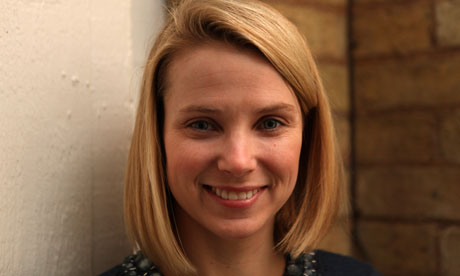
So three huge cheers to Marissa Mayer, who has just been made chief executive of Yahoo. A 37-year-old female engineer has just taken a top job in an industry seemingly dominated by young men. Hurrah. And she's six months pregnant. Huge hurrah. But she promises not to take her maternity leave. Harrumph?
"I like to stay in the rhythm of things," she tells Fortune in the 24 hours between leaving Google and starting at its failing rival. "My maternity leave will be a few weeks long and I'll work throughout it." She went on to say that the baby boy, due in October, was "super-active … My doctor says that he takes after his parents".
The only concession made to her pregnancy is apparently the decision to move the September board meeting from New York to California, which is closer to Mayer's penthouse suite at the top of a Four Seasons hotel.
Mayer told Yahoo directors shortly after being contacted by headhunters for the top job that she was pregnant. They "showed their evolved thinking" in not once asking her about it.
In the UK and much of Europe, "evolution" on the matter in general means a push towards shared parental leave and more time off. So, although her appointment is fantastic news for many reasons (which I'll come to later) it conveniently shows the gulf between the US and much of Europe when it comes to the rights of working parents. Even our own, in some ways neanderthal government, has posited opening up the right to a year's parental leave to both men and women equally. Yet in the US, where women have the right only to 12 weeks' unpaid leave, progress is often perceived as a woman giving birth while signing off on an acquisition and sacking a few hundred staff members.
Mayer's appointment also comes after Anne-Marie Slaughter, a former director of policy planning at the state department, reopened the hoary debate with a piece in Atlantic magazine in which she regretted a career that had taken her away from her children.
Sylvia Ann Hewlett, the president of the Centre for Talent Innovation and author of the War against Parents criticised the piece and wrote that paid parenting leave wasn't "even on the Democratic agenda" this election season, which it was 15 years ago. "Like it or not, the country has moved to the right, and the idea that we're about to pass legislation that will subsidise quality childcare or lengthen the school day is so much pie in the sky." Hewlett points out that a recent survey cited by Hewlett showed that 41% of women in professional full-time jobs are childless.
Of course, you will all be saying, quite rightly, that the issue of paid parental leave has nothing whatsoever to do with Mayer. As Google's 20th employee, she is already fabulously wealthy and able to pay for her own army of childcarers.
The reasons to cheer her appointment really do outweigh the message she is sending about child-weaning and ambition. As CEO, she also has flexibility written into her job description. And given the fact that she joins just 18 women heading companies in the Fortune 500, she is living the "step up to the plate even when about to drop" message expounded by many of the US's top female role models – well, Sheryl Sandberg at Facebook, mainly.
She is also that rare creature, a high-flying female engineer. The latest figures from the Computing Research Association Taulbee Survey suggest that less than 12% of computer science degrees were awarded to women in 2010-11.
In an interview six years ago, Mayer said that Google was "a great place for geeks: male or female … If you get excited about programming light strings at the weekends and working all hours, then it's a fabulous place to be."
Mayer has also talked extensively about her need for just four to six hours of sleep a night – she catches up by taking week-long vacations every four months, apparently. "I don't believe it's true that you burn out sooner or later if you work 80 hours a week, as long as you keep the thing that's important to you sacred."
She may boast of a work rate that frankly makes me feel ill, but it's still hard not to cheer Marissa Mayer. Don't you think?

